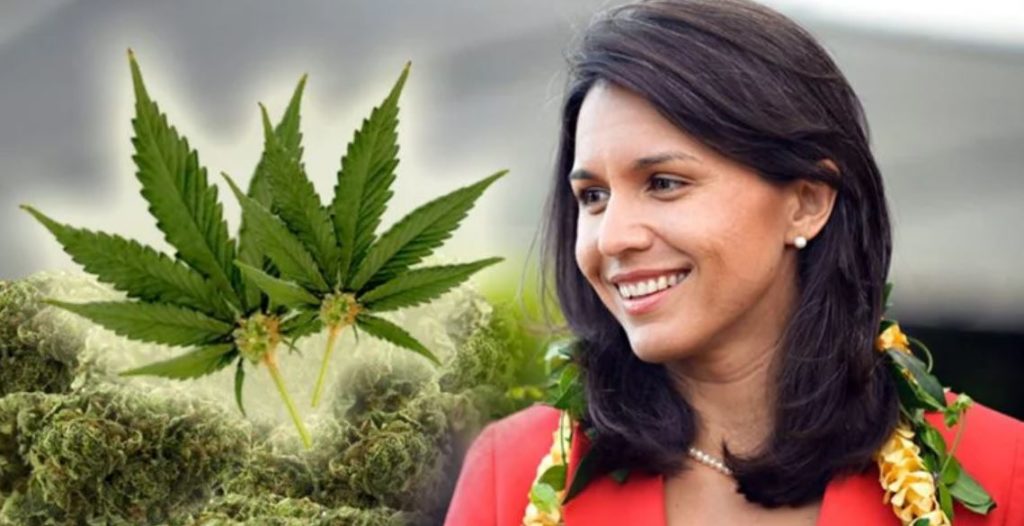 By Elias Marat
By Elias Marat
Tulsi Gabbard, Hawaii’s democratic congresswoman and one of many entrants in the crowded 2020 presidential race, is already turning heads thanks to her anti-interventionist foreign policy approach and progressive stance on a variety of issues, making her an outlier among establishment Democrats.
If her pre-campaign messaging and campaign launch speech are any indicator, the potential presidential contender has no intention of backing down – especially when it comes to her strong advocacy of medical marijuana and harsh criticisms of the criminal justice system and pharmaceutical industry.
Declaring her formal entrance into the Democratic Party presidential primaries, Gabbard issued a rousing call to end the for-profit prison industry, which has seen private corrections corporations rake in profits while shirking prisoners’ and immigrant detainees’ food, health care, and other essential services while exploiting incarcerated people as essentially slave labor.
“We must stand up against private prisons, who are profiting off the backs of those caught up in a broken criminal justice system,” Gabbard said.
Continuing, she added that “a system that puts people in prison for smoking marijuana while allowing corporations like Purdue Pharma, who are responsible for the opioid-related deaths of thousands of people, to walk away scot-free with their coffers full.”
We must stand up against private prisons, who are profiting off the backs of those caught up in a broken criminal justice system. This system which favors the rich and powerful and punishes the poor CANNOT stand. https://t.co/tw2NJx3FbQ #TULSI2020 pic.twitter.com/ux2xm3Vblk
— Tulsi Gabbard (@TulsiGabbard) February 8, 2019
Purdue Pharma, the company responsible for making the OxyContin narcotic pill, was recently exposed in court filings by the Massachusetts attorney general to have deliberately conspired to mislead doctors and patients about the dangerous and addictive nature of the opioid in hopes of maximizing company profits.
Gabbard added:
This so-called criminal justice system, which favors the rich and powerful and punishes the poor, cannot stand.
Gabbard, an Iraq war veteran and member of Congress since 2013 who previously served as a state legislator in Hawaii and city councilmember in Honolulu, has long been a supporter of progressive cannabis laws and opponent of federal prohibition laws.
Last year, pro-legalization political advocacy committee National Organization for the Reform of Marijuana Laws (NORML PAC) hailed Gabbard as a leader in the fight for criminal justice reform and the decriminalization of marijuana on a federal level.
In their endorsement of the congresswoman from Hawaii, the group laid out her extensive work demanding sensible cannabis policies:
She is the lead Democratic sponsor of the Ending Federal Marijuana Prohibition Act, which would take marijuana off the federal controlled substances list. She introduced the Marijuana Data Collection Act, which lays the groundwork for real reform by producing an objective, evidence-based report on current state marijuana laws. Congresswoman Tulsi Gabbard has called for closing the gaps between federal and state law to resolve current contradictions and provide legally abiding marijuana businesses with clear access to financial services. She also co-sponsored the Marijuana Justice Act to reform unjust federal marijuana laws and empower minority communities that have been disproportionately impacted by the failed War on Drugs, the Secure and Fair Enforcement (SAFE) Banking Act to allow equal banking access and financial services for marijuana-related businesses, and the RESPECT Resolution to encourage equity in the marijuana industry.
Gabbard has also drawn a sharp nexus between the demands of Big Pharma lobbyists and continued prohibition laws. Last year, she shredded then-Attorney General Jeff Sessions for rescinding the Obama-era Department of Justice memo, or Cole Memorandum, that instructed federal prosecutors to not enforce federal prohibition laws in states that legalized marijuana, characterizing the move as one which would “exacerbate an inhumane, ineffective system that tears families apart.”
“Sessions’ actions to protect the bottom lines of the for-profit private prison industry, and Big Pharma whose opioids and drugs flourish in part due to the marijuana prohibition, while trampling on states’ rights and turning everyday Americans into criminals is an injustice,” she wrote on Twitter.
Sessions’ actions to protect the bottom lines of the for-profit private prison industry, and Big Pharma whose opioids and drugs flourish in part due to the marijuana prohibition, while trampling on states’ rights and turning everyday Americans into criminals is an injustice.
— Tulsi Gabbard (@TulsiGabbard) January 4, 2018
And in a 2017 statement calling for an end to federal prohibition, Gabbard demanded that the government “work for people like veterans and healthcare advocates instead of pharmaceutical lobbyists who will continue to push dangerous and addictive painkillers even amidst an opioid epidemic.”
Gabbard isn’t the only contender to call out the pharmaceutical industry’s role in stalling marijuana legalization and criminal justice reform.
Recent entrant and New York Democratic Senator Kirsten Gillebrand has also blasted Big Pharma, noting:
To them, it’s competition for chronic pain, and that’s outrageous because we don’t have the crisis in people who take marijuana for chronic pain having overdose issues … It’s not the same thing. It’s not as highly addictive as opioids are.
This article was sourced from The Mind Unleashed.

Be the first to comment on "Tulsi Gabbard Wants to Legalize Marijuana, Punish Big Pharma and End Private Prisons"